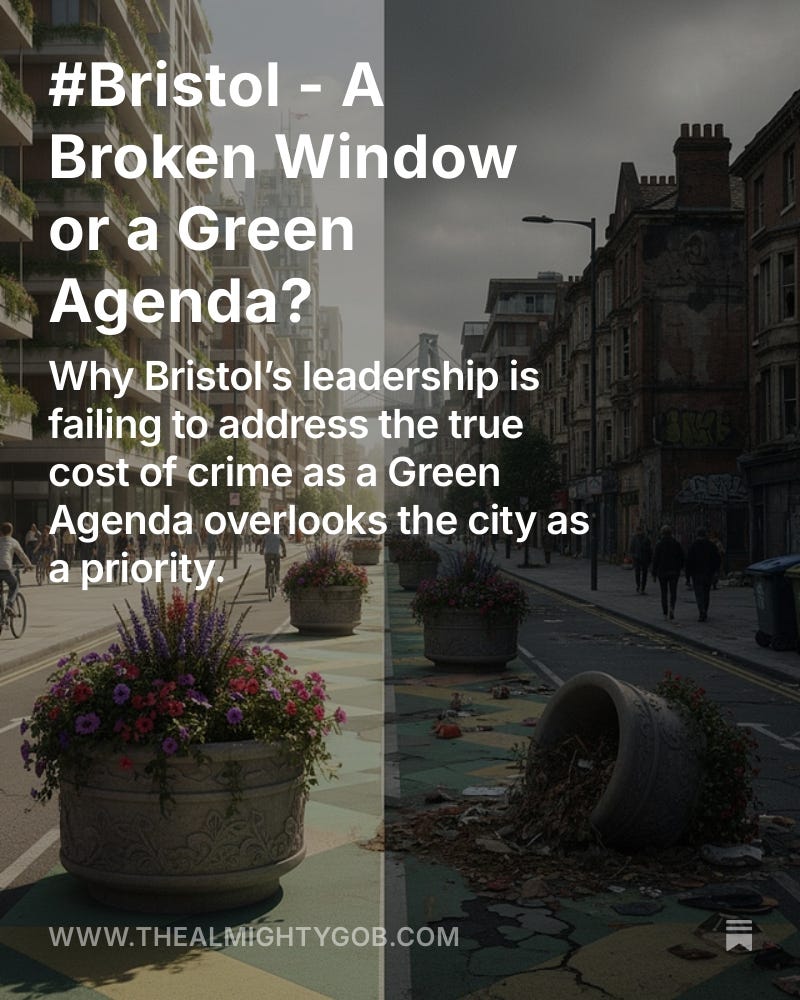#Bristol - A Broken Window or a Green Agenda?
Why Bristol’s leadership is failing to address the true cost of crime as a Green Agenda overlooks the city as a priority.
Following on from yesterday’s post about Bristol's two plagues, it’s clear that a fundamental misalignment exists between the city's leadership and the realities on the ground. Bristol is a city of contrasts, celebrated for its vibrant culture yet burdened by persistent challenges of deprivation and rising crime. The ruling Green Party-led Bristol City Council has made its priorities clear, with a significant focus on sustainable transport projects aimed at reducing car usage and carbon emissions. But as millions are funnelled into bus lanes and "liveable neighbourhoods," a compelling case can be made that the council is overlooking more immediate and vital concerns, particularly the urgent need for a robust response to knife crime and a direct investment in the city's most deprived areas.
The Focus on Transport.
The council's transport agenda is ambitious. Plans to ban cars from major thoroughfares like Park Street, a £15 million scheme, are a clear signal of their commitment to a car-free future. Other initiatives include the roll-out of controversial low-traffic neighbourhood (LTN) schemes, such as the one in East Bristol, which aims to make residential streets safer for walking and cycling. While the stated goal is to create a more pleasant, healthy, and environmentally friendly city, critics argue that these projects often come with significant costs and disrupt daily life for residents and businesses. This dynamic has come into sharper focus in 2025, with initiatives that critics argue are more symbolic than substantive. The council seems more concerned with where to place street-blocking, oversized plant pots, and what shade of color to paint the next road than tackling the city's "broken windows."
A Broken Window or a Green Agenda?
The "broken window" theory posits that visible signs of crime, anti-social behaviour, and civil disorder create an environment that encourages further, more serious crime. A rational argument can be made that the Bristol City Council is neglecting these "broken windows" in favour of abstract, "pie-in-the-sky" green agendas. The true cost of crime extends far beyond the financial burden on the justice system, encompassing profound emotional and social harm. The UK-wide cost is estimated at up to £250 billion, highlighting the enormous scale of the problem. Bristol's council has chosen to invest significant public funds in transport initiatives that, while aimed at long-term environmental goals, do not directly address the immediate, tangible issues of rising crime and entrenched deprivation in wards like Hartcliffe and Filwood. The "broken windows" of Bristol—rising violent crime, drug offences, and public order issues—are being left to worsen.
By focusing on transport policies rather than public safety and the social well-being of its most vulnerable citizens, the council's priorities appear misaligned. A rational, evidence-based approach would argue that a society cannot thrive on ideological visions alone if its foundations are crumbling. Investing in public safety, youth services, and deprived areas is not only a moral imperative but also a sound economic decision that prevents more costly and widespread problems down the line. The council's current trajectory suggests a preference for a green agenda at the expense of addressing the immediate and deeply felt needs of its people, risking a more significant societal breakdown in the process.
The Reality on the Ground: 2025 Crime and Deprivation.
The data from the 2024/25 period paints a concerning picture. Total recorded crime in Bristol rose to 131.8 crimes per 1,000 people, an increase of 8.3% from the previous year and the highest rate in eight years. Violent crime surged by 15.9%, and over 40% of residents in deprived areas like Hartcliffe & Withywood reported that fear of crime affects their daily lives. Communities in the outlying areas of Bristol, such as Hartcliffe and Withywood, for example, also face significant barriers to opportunity, including a lack of educational prospects and poor transport links, trapping many in a cycle of deprivation that directly fuels crime.
The Unanswered Questions.
Bristol's political journey has been defined by a fundamental misalignment between council priorities and the public's immediate concerns. The legacy of Marvin Rees's leadership, marked by unfulfilled ambitions and a public health approach to crime that failed to deliver visible results, has been followed by a Green Party administration that appears to prioritise ideological, low-impact initiatives. Now, in 2025, with crime rates rising, particularly in violent offences, and a growing public fear of crime, the council's focus on placing street-blocking plant pots and painting roads has become a potent symbol of this disconnect. Ultimately, the evidence suggests that by neglecting the "broken windows" in favour of abstract environmental goals, Bristol's leadership has risked a more significant societal breakdown. This leaves the city facing a series of profound and unanswered questions: How can Bristol truly become a "liveable" city if its citizens don't feel safe on its streets? What is the true cost of a green agenda that ignores the human cost of rising crime and persistent deprivation? And when will Bristol's leaders finally address the foundations of a city that, for many, feels like they're crumbling?



Well, it's not just a Green agenda. It's all of them. And presumably having a population increasingly afraid of one another isn't something that bothers tptb much. Which may be at least part of what not doing much about crime and doing too much about blocking and painting streets have in common.